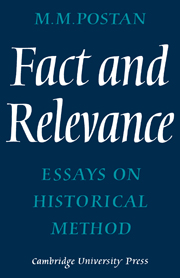Book contents
- Frontmatter
- Contents
- Acknowledgments
- Preface
- 1 Reason in social study
- 2 History and the social sciences
- 3 The historical method in social science
- 4 Function and dialectic in economic history
- 5 Fact and relevance in historical study
- 6 Economic and social history
- 7 Economic growth
- 8 A plague of economists?
- 9 The uses and abuses of economics
- 10 Agriculture and economic development: a lesson of history
- 11 Technological progress in post-war Europe
- 12 A study of history
- 13 Karl Marx: a democrat?
- 14 Hugh Gaitskell: political and intellectual progress
- Index
1 - Reason in social study
Published online by Cambridge University Press: 07 October 2011
- Frontmatter
- Contents
- Acknowledgments
- Preface
- 1 Reason in social study
- 2 History and the social sciences
- 3 The historical method in social science
- 4 Function and dialectic in economic history
- 5 Fact and relevance in historical study
- 6 Economic and social history
- 7 Economic growth
- 8 A plague of economists?
- 9 The uses and abuses of economics
- 10 Agriculture and economic development: a lesson of history
- 11 Technological progress in post-war Europe
- 12 A study of history
- 13 Karl Marx: a democrat?
- 14 Hugh Gaitskell: political and intellectual progress
- Index
Summary
Truth, Sir, is a cow, which will yield such people no more milk, and so they are gone to milk the bull.
DR JOHNSONAcademic readers in this country and in France have recently been treated to several doses of conservative anti-rationalism. There are indeed signs that in political and social philosophy as well as in ethics it is again becoming fashionable to look for antidotes to reason and to find them in history, intuition and tradition. The attitude is sufficiently recent to attract the young, and its recipe is sufficiently pungent to please the jaded. I can therefore predict it a flourishing career in the next few years, and this alone makes its argument (and for all its anti-rationalism the new fashion cannot do without an argument) worth looking into. But the argument must be treated to its own medicine and considered as an historical phenomenon. For thus considered the ‘new look’ of political philosophy may well turn out to be a modish variant of an ancient and recurrent outline.
Distrust of reason is indeed a perennial feature of conservative thought. The appeal to tradition, as if it were the opposite of thought, or to history, as if it were the opposite of invention, have always been the favourite themes of the conservative argument on politics and state. And not only on politics and state. Conservatism, like the rationalism it attacks, is not so much a view of social organization as a version of personal life; and in matters personal the attachment to inherited moral conventions goes hand in hand with aversion from intellectual standards. To conservatives the threat of thought is one and indivisible.
- Type
- Chapter
- Information
- Fact and RelevanceEssays on Historical Method, pp. 1 - 14Publisher: Cambridge University PressPrint publication year: 1971



